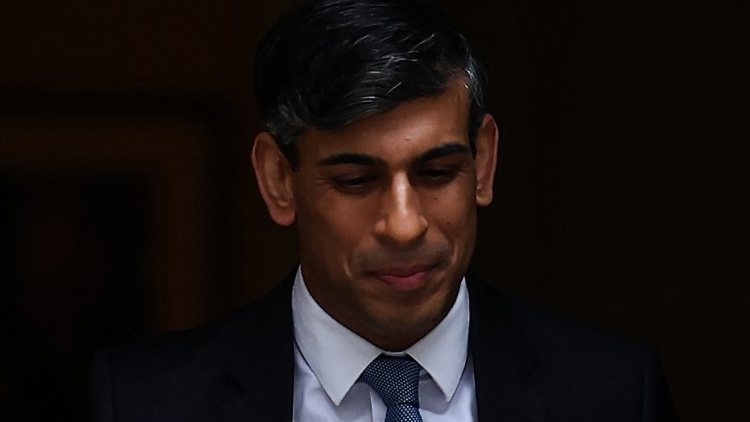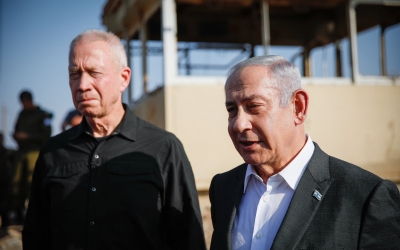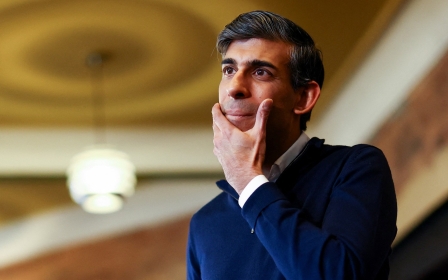War on Gaza: How far Britain has fallen from Thatcher's support for international law

Forty-three years ago, the Jewish Chronicle interviewed Margaret Thatcher, then the British prime minister, in the wake of Operation Babylon, the illegal Israeli attack on an unfinished Iraqi nuclear reactor near Baghdad.
The interviewer, Monty Modlyn, accused Britain of being “the leading advocate of the Arab case against Israel” and expressed his perplexity that Thatcher had accused Israel of “a grave breach of international law.”
Thatcher stood her ground: “I uphold international law. Once we go away from that, we shall not know where we are.”
Then she delivered a moral lecture for the ages.
“If we are not going to live by a system of international law, we are going to live by international anarchy,” she said. “Then no people anywhere in the world are safe.”
New MEE newsletter: Jerusalem Dispatch
Sign up to get the latest insights and analysis on Israel-Palestine, alongside Turkey Unpacked and other MEE newsletters
Compare and contrast Thatcher’s eloquent defence of the international order with Prime Minister Rishi Sunak’s reaction to the International Criminal Court (ICC) announcing that it is seeking arrest warrants against both Hamas and Israeli leaders in connection with alleged crimes against humanity.
Thatcher, though a strong supporter of the state of Israel and a famous admirer of the Jewish people, threw her weight behind international law.
Sunak has trashed it, saying the court ruling was “deeply unhelpful” before parroting Israeli Prime Minister Benjamin Netanyahu’s talking point that the ICC had implied a “moral equivalence” between Hamas and Israel.
Insidious pattern
These remarks display a wilful failure to understand the rule of law. The ICC was not asked to make any judgment about equivalence.
The court, which Britain helped to set up as a tribunal to judge political leaders accused of war crimes, faced one simple task: to establish whether there were grounds to apply for arrest warrants.
Follow Middle East Eye's live coverage of the Israel-Palestine war
Karim Khan, chief prosecutor of one of the most respected courts around the globe, was clear that those grounds existed.
They included, as far as Netanyahu is concerned, starvation of civilians as a method of warfare; intentionally directing attacks against a civilian population; and extermination by starvation, among other charges.
If Britain was a true friend, we'd be helping Israel find a way out of its bloody moral morass, not lending it support as it digs even deeper
The Sunak government’s attack on the ICC is part of an insidious pattern. Earlier this year, Sunak mocked the International Court of Justice (ICJ) for its decision to investigate Israel in the face of a plausible genocide.
As with the ICC, Britain is a signatory of the ICJ and claims to celebrate its values.
Not anymore. Something has changed in Britain over the last four decades, and the example of Thatcher shows how much.
I was her admirer then and remain so now, even though I accept that she was - and remains - hated by the left, and sometimes for good reasons. But she grew up in the 1930s and became a young woman in the war years. Like almost all of that magnificent wartime generation, she understood through lived experience the importance of the rule of law, and the need for powerful institutions to defend it.
As she told the Jewish Chronicle, justice was not optional, and it must apply to friends as well as enemies.
Pariah state
That’s why Thatcher would have come out in defence of the ICC prosecutor against the gangsterism underlying US calls for sanctions against the court.
She would have flayed Netanyahu for his demented attack on Khan for alleged antisemitism, “blood libel”, and creating a “twisted and false moral equivalence between the leaders of Israel and the henchmen of Hamas”.
And she would have mocked US President Joe Biden for a shameless double standard. International law, she would have lectured the US president, applies to friends and enemies alike. That means Russian President Vladimir Putin, Hamas leader Yayha Sinwar - and Netanyahu.
Only one British mainstream politician spoke the language of Thatcher last week, and it wasn’t a Tory.
The Labour Party’s foreign affairs spokesman, David Lammy, articulated Thatcher’s well-grounded vision when he spoke up for the ICC and the rule of law in the Commons this week.
Under Thatcher, Britain was one of the strongest upholders of the international order. Sunak’s blind support for the most far-right government in Israel’s history is turning Britain into a pariah state.
This is not just a calamity for Palestinians; it a tragedy for the Tory party, and of course, for Britain. Our blind support is a disaster for Israel, too. If Britain was a true friend, we’d be helping Israel find a way out of its bloody moral morass, not lending it support as it digs even deeper.
The views expressed in this article belong to the author and do not necessarily reflect the editorial policy of Middle East Eye.
Middle East Eye delivers independent and unrivalled coverage and analysis of the Middle East, North Africa and beyond. To learn more about republishing this content and the associated fees, please fill out this form. More about MEE can be found here.






